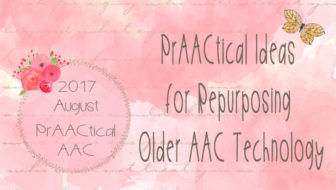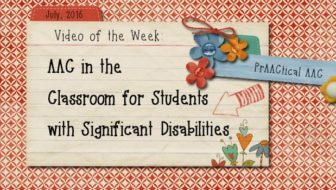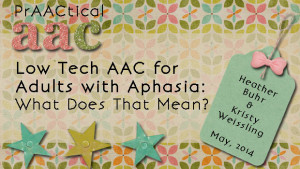Tag Archive: low tech
January 8, 2020
by Carole Zangari -

While we are incredibly grateful for all of the high tech AAC options that are currently available, there is no denying that no tech and low tech communication tools play an important role in a comprehensive AAC system. Today, we turn to Margaret Cotts, a veteran AT Specialist, for an overview of no and low tech tools. This webinar is made possible by CoughDrop and was originally presented as part of their free, annual conference, AAC in the Cloud. Our thanks to Margaret and the wonderful team for hosting this event and sharing this helpful video. You can find the handout for this session here. Enjoy! Direct Link to Video: https://www.youtube.com/watch?v=7j4a_rk5g9s You can see some of Margaret’s other work here.
Filed under: Video of the Week
Tagged With: low tech, no tech
August 21, 2017
by Carole Zangari -

If you’ve been working in this field for awhile, chances are you’ve got some older voice output technology lying around. Poke around in the back of a closet or tucked way on top of the cupboards and you might encounter some hidden treasures. If you look w-a-a-a-y back there, you just might find a few digitized (recorded) speech devices that haven’t been used for some time. With only 2, 4, 8, 9, or 32 locations, these are generally insufficient for individuals with complex communication needs to use as their personal communication devices. When matched to the right purpose, though, these are wonderful tools that often have a lot of life left in them. How can we put those low tech AAC devices to work? Here are a few ideas to get us started. Build letter-sound knowledge: Program each cell with the sound of each letter so that the AAC student... [Read More...]
Filed under: Featured Posts, PrAACtical Thinking
Tagged With: low tech, SGD, SGD
July 6, 2016
by Carole Zangari -

Most classrooms that include children with the most significant disabilities are comfortable with low tech AT and use it frequently throughout the day. In today’s video, AT consultant Kelly Fonner, discusses strategies for maximizing the use of those technologies and progressing to more advanced communicative options. A frequent presenter at international, national, and state conferences, Kelly shares ideas for taking what already works in these classrooms and moving to the next level. As always, she provides clear explanations, rationales, and the all-important ‘how-to’ for implementing additional strategies and technologies. Many thanks to Kelly and AbleNet University for making this video available. Direct Link to Video: https://www.ablenetinc.com/customer/account/login?referer=aHR0cHM6Ly93d3cuYWJsZW5ldGluYy5jb20vcmVzb3VyY2VzL3JlY29yZGVkX3dlYmluYXJzP3M9a2VsbHkrZm9ubmVyJnNvcnQ9JnBvc3RfdHlwZT1yZWNvcmRlZF93ZWJpbmFycw
Filed under: Video of the Week
Tagged With: beginning communicator, implementation ideas, low tech
November 3, 2015
by Carole Zangari -

Walk into almost any program that has been serving people with AAC needs for awhile, and chances are that they have a box or cupboard with AT that is a little past its prime. Among all those treasures, you’ll probably find a few talking switches or single message voice output devices that no longer work like they used to. These little workhorses are too valuable to toss without at least trying to repair them. Many thanks to David Selover, AT Coordinator of the TRAID/Project Adapt Library, for the wonderful guide to repairing these beauties. http://www.instructables.com/id/How-to-repair-a-Big-Mack-AAC-device-and-upgrade-/
Filed under: PrAACtical Thinking
Tagged With: DIY, low tech, single message voice output device, talking switch
May 18, 2015
by Carole Zangari -

In honor of ASHA’s Better Hearing and Speech Month, we’ve invited clinicians who use AAC in their schools to share a bit about their work here on PrAACtical AAC. Today’s post is from Kaitlyn Connors and Rachel Egbert, two school-based SLPs in New Jersey. For the past 8 years, Kaitlyn has worked with children who use AAC. She earned her Master’s degree from Ithaca College and remains passionate about AAC, and helping each student communicate to the best of their abilities. Rachel earned her Master’s degree from the University of Nebraska at Omaha in 2013. She eagerly keeps abreast of the latest advances in AAC, which help her to deliver the most positive outcome possible for her students. Both Kaitlyn and Rachel currently serve students at Larc School. Beyond Requesting: PrAACtical Ideas for Building Language in the Classroom To take one student beyond requesting during snack time we implemented a core language board... [Read More...]
Filed under: PrAACtical Thinking
Tagged With: classroom, core vocabulary, education, Kaitlyn Connors, Larc School, low tech, Rachel Egbert
May 27, 2014
by Carole Zangari -

Aphasia Awareness Month is just around the corner, and getting us ready for that is this wonderful post on using low tech AAC with people who have aphasia. We’re delighted to welcome back our friend and colleague, Dr. Kristy Weissling, who is collaborating with Heather Buhr, to share some thoughts on this topic. ::::::::::::::::::::::::::::::::::::::::::::::::::::::::::::: For many, the term Augmentative and Alternative (AAC) brings to mind technology, speech-generating devices, and now – more than ever before – iPads. But as we know, AAC encompasses much more than that. We all use AAC when we make facial expressions or gestures, use symbols or pictures, or write. We would like to explore AAC and more “low-tech” options that help our clients express their thoughts, needs, wants, and ideas. Low-tech strategies can range from the use of written choice, to communication boards, to communication books. In this article we will specifically address communication... [Read More...]
Filed under: PrAACtical Thinking
Tagged With: aphasia, communication book, Heather Buhr, Kristy Weissling, low tech





